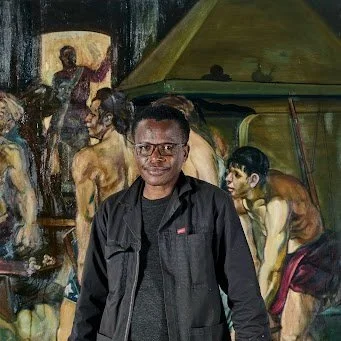Johannes Phokela
born 1966, Soweto, South Africa
Phokela is a South African painter and sculptor. As a child, he witnessed the Soweto uprising and he later created memorials to honour those involved in it. Phokela trained under Durant Sihali and at the Federated Union of Black Artists, Johannesburg, before concluding his studies in London and living in that city for the next 20 years. The radical politics of the British Black Arts Movement contributed to shaping his approach, as did frequent visits to UK galleries. Phokela played an advisory role in establishing The Bag Factory, Johannesburg (1990) and was one of the founding members of the Gasworks Studios, London. This inspired him to do volunteer work for The United Nations Educational, Scientific and Cultural Organization (UNESCO) and led to his participation in a residency programme in Senegal through the British Council. He has been given several prestigious awards.
Phokela's artistic practice primarily involves oil painting on canvas in the highly skilled manner of Dutch and Flemish artists of the 17th and 18th centuries. He often takes his subjects and compositions from works by these artists as well as by later ones like Francisco de Goya and the 19th century painter Edouard Manet (whose own paintings sampled masterpieces from earlier centuries). In a process he calls “destruction of iconic images,” he adds to them African men, women and children, turning art historical references into subversive meditations on colonialism and its legacies. ‘Playing the fool’, he inserts red clown noses, images from films and advertisements, and objects such as AK-47 guns and credit cards, and he often divides the original compositions into frames like comic strips. All this creates a shocking contrast between the beauty of his colours and refined oil painting technique, and the sharp satire of the acts we see playing out before us.
Phokela’s paintings sometimes refer to continuing racial divisions within South African society. Exciting Recipes (2015) represents a group of white people at a braai with Black servants watching from the sidelines. The whites look greedily at a table laden with food and drink, while a Black man carves a huge, flayed carcass and another sits on the floor with a bowl of off-cuts. Laplandish Dream (2014) portrays a fat, naked Santa Claus lying on the grass with a glass of wine and bowl of fruit, while a young Black woman – wearing nothing except an apron and headscarf – hangs his clothes out to dry.
Phokela’s work has been exhibited in institutions such as the Museum Boijmans Van Beuningen, Rotterdam and the Johannesburg Art Gallery, as well as in the South African Pavilion at the Venice Biennale (2013). It is part of many permanent collections including the Arts Council Collection, Southbank, London, the National Museum of African Art, Smithsonian Institute, Washington D.C., and Zeitz MoCAA, Cape Town.

